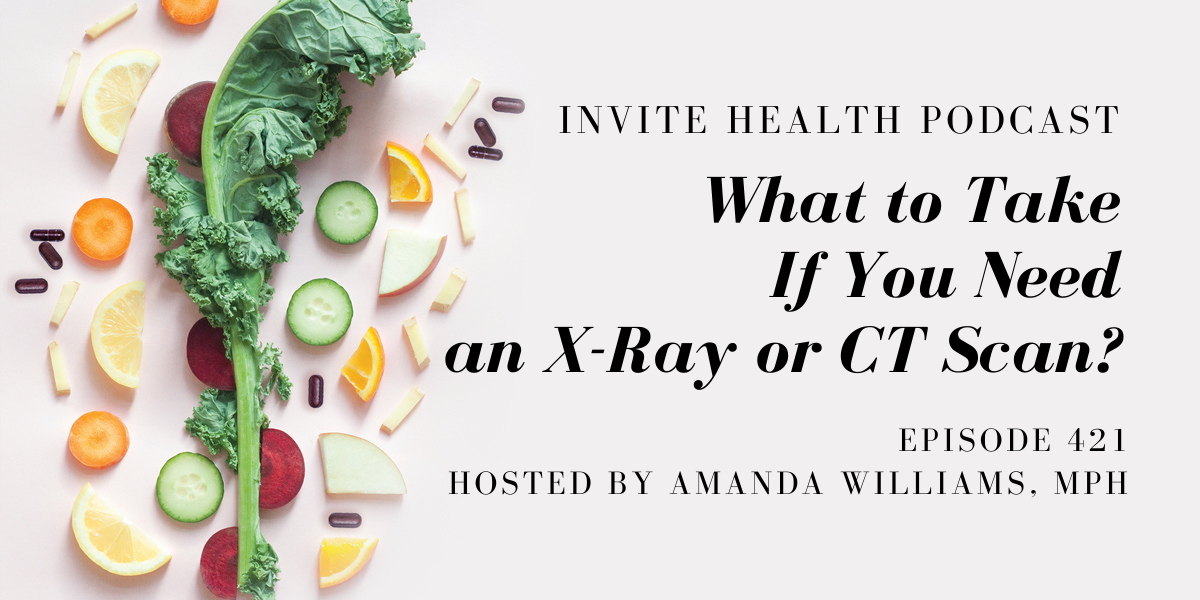What to Take If You Need an X-Ray or CT Scan – InVite Health Podcast, Episode 421

X-ray
InViteⓇ Health Podcast, Episode hosted by Amanda Williams, MPH
Subscribe Today!
If you’ve ever had to have an X-ray or a CT scan done, you’ve probably had the thought in the back of your mind if this is safe. Today I want to talk a little bit about what we do know when it comes to that radiation exposure and what risks are actually involved, whether we have to go in for dental X-rays, chest X-rays or CT scan.†
How common are X-ray tests?
It’s estimated that in this country alone, we probably do over 100 million regular X-rays of the chest or bones every single year. When it comes to CT scans, we’re looking at probably over 80 million CT scans that are conducted each and every single year. When we look at the dental X-rays, this is over a billion conducted every single year in the United States. That’s a lot of radiation exposure that we can put ourselves at risk for.†
Considering how common these tests are, we have to be aware of the potential risks. We know that there is a dose-dependent adverse effect of X-rays that has been linked to cancers. Many researchers have been studying that particular cancer risk in both adults and children. It’s estimated that radiation exposure during medical imaging can be associated with 2% of all cancers in the United States.†
Studies have shown that exposure to ionizing radiation from X-rays can be very problematic. This is because of DNA damage, which can result in a DNA mutation that can then lead to cancer further down the road.†
TEST YOUR GENES FOR NUTRIENT DEFICIENCIES – INVITE HEALTH PODCAST, EPISODE 39. Listen Now>>
Nutrients that can help protect your body from the effects of radiation
When it comes to oxidative stress and cellular damage, we have to think about antioxidants. Let’s run through the basics of nutrients you should be considering taking when it comes to your exposure to X-rays and CT scans.†
We know that antioxidants are going to be important when we have to shield ourselves from the danger of the radiation. We can look at things such as EGCG. Those polyphenols that come from green tea have been shown to be very beneficial when it comes to fending off the damaging effects of radiation. Quercetin is also beneficial for this purpose. All of these nutrients are things that we should be considering if we are going in for an X-ray or CT scan.†
We can certainly look at curcumin, which offers a kind of dual-action. It is working as an antioxidant to protect normal tissue, but it is also working in terms of the upregulation of genes that are responsible for cell death and cancers. This is why I generally include Bio-Curcumin 5-Loxin into a regimen if someone is going in for one of these tests.†
Other nutrients such as ginkgo biloba, ginseng extract and silymarin extract have also been studied for their radioprotective properties.†
In this episode, Amanda Williams, MPH discusses the potential dangers of radiation from common medical tests. She explains how this can be related to cancer and offers suggestions for nutrients that can help fend off this damage.†
Key Topics:
- Why might you need an X-ray or CT scan?
- Research on the different types of radiation
- When is it okay to get an X-ray or CT scan?


